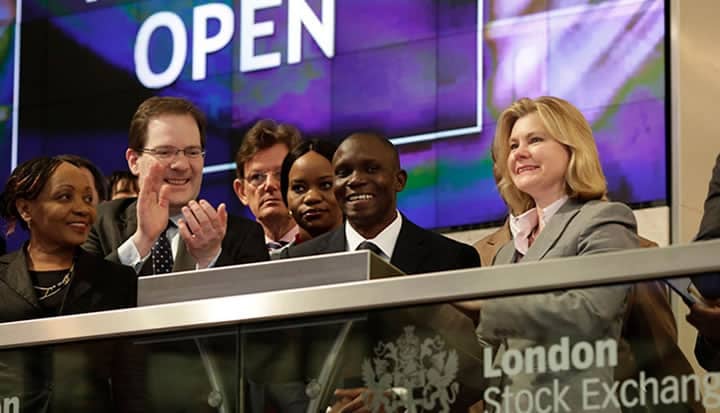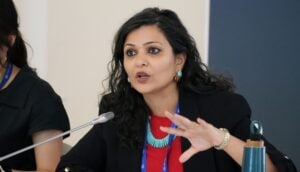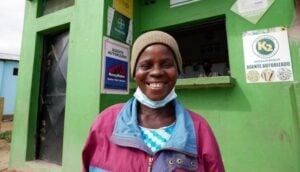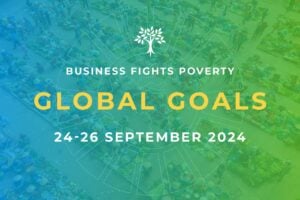Today, the UK Development Secretary, Justine Greening, delivered a speech at the London Stock Exchange on the role of business in economic growth: “Smart aid: Why it’s all about jobs”. Below is a transcript of the speech.
It’s a great pleasure to be here with everyone this morning. And I want to say a massive thank you to the London Stock Exchange for hosting us today.
Today marks the start of a significant new partnership between the Department for International Development (DFID) and the London Stock Exchange Group.
This morning we signed up to formally working together to accelerate capital market development in Africa’s frontier economies.
And I believe your entrepreneurship and our knowledge will make for a very powerful combination.
This strategic partnership represents DFID’s new, ambitious approach to economic development.
Almost a year ago I spoke in this same room and talked about how DFID would take a fundamentally smarter approach to aid…focusing on driving growth and jobs, and ultimately lifting countries out of poverty for good.
And I said we’d be smart about using British expertise and British businesses to help us drive entrepreneurship in developing countries.
Since then, DFID has been on a transformational journey.
Economic development is now a core priority right across the department.
And we are working with a whole range of new business partners.
For the first time we have financed business projects in developing countries through returnable loans…which means our money comes back when businesses are successful.
And today I want to tell you about this radical journey, and where we go from here.
Why economic development
Economic development is absolutely and without question, the only way we can ultimately defeat poverty.
It’s not just speculation… this is the unequivocal lesson of the last 20 years.
In the last 2 decades the number of people in the world living in extreme poverty fell by half. That’s better lives for more than 700 million people.
And there is no question why: the real driving force behind this reduction was economic growth. Wherever long-term per capita growth is higher than 3%, poverty falls significantly.
It really is that simple. Growth reduces poverty through jobs…raising incomes for individuals through the dignity of work and providing tax receipts for governments to fund basic public services like health and education.
And it has huge implications for the development community.
For starters, it’s made us much more ambitious. If extreme poverty can be halved in 20 years then the obvious question is…can we end extreme poverty in the next 20 years?
What we do know is that we can’t just sit back and wait for this to happen. Most developing countries are not growing fast enough to reach that zero poverty goal.
1.2 billion people are still living in extreme poverty and these are the most vulnerable, most disadvantaged, and most difficult people to reach. Often they are girls and women.
And in fact with demographics showing huge growth in the numbers of young people, economic growth is needed just to stand still on poverty, at the very minimum.
So what does this mean for aid?
What we think of as ‘traditional aid’ continues to play a critical role…helping more children into school, beating killer diseases like polio and malaria, supporting countries like the Philippines when disaster hits.
These are life-changing, life-saving programmes, and we’re going to keep doing them.
But by themselves they are not enough.
Ask the poorest people and the communities they live in what they want most and they will say a job…The chance to work their way out of poverty, the chance to provide for their families and build themselves a future.
As countries develop, the assistance they need will evolve and so our aid needs to be smart and to evolve with them too.
Smart aid can take the form of building a better tax regime, helping to reduce trade barriers, or giving entrepreneurs and small businesses an economic launchpad.
It can also be focusing on what the Prime Minister calls the Golden Thread. In other words, helping to build the institutions, the values by which individual rights to liberty and property are safeguarded…elements that represent a green light to companies thinking about investing in a frontier economy.
By being smart about aid we can drive the kind of sustainable, inclusive growth that creates more and better jobs and raises incomes.
But if we’re not willing to adapt to countries’ needs as they are today we’ll be stepping away from their development journey when our aid could have the greatest impact…When it could help them transform from aid dependency to self-reliance.
The Global Race
Of course smart aid isn’t just good for the countries we’re helping, it’s good for Britain too.
If we get development right we are market making and creating new investment opportunities.
As a former Treasury Minister, I’m acutely aware that Britain’s future economic strength depends on us increasing our global exports. As part of its long-term economic plan for building a stronger and more competitive economy, this government aims to double UK exports to £1 trillion by 2020.
Success hinges on our goods and services being taken to new markets around the world.
We all recognise the importance of the world’s new emerging powers – the BRICS countries, Brazil, Russia, India, China and South Africa.
And we’re also improving our relationships with the world’s next tier of emerging economies…fast growing markets in Mexico, Indonesia, Nigeria, Turkey. The MINT countries as they’ve been coined.
But what about tomorrow’s BRICS and MINT countries?
Many of the countries my department works in have high levels of growth, young and growing populations and a wealth of natural resources.
And we could wait until these markets have grown, until they are less risky and the opportunities are more obvious.
But how much better to start our relationships with these countries sooner rather than later.
As the Prime Minister has said, we’re in a global race and if we want to be ahead of the game, we can’t simply follow the crowd.
So that means being in today’s frontier markets. So that when they do emerge, they do so with Britain as a key partner. This frontier economy strategy is critical for safeguarding the UK’s economic prospects in the long-term…just as it is in helping DFID delivering on its ambition of eradicating poverty
UK exports to developing countries increased by almost $60 billion between 2002 and 2012. In those 10 years exports to Nigeria and Ethiopia doubled, our exports to Tanzania trebled and UK exports to Ghana increased almost 4-fold.
By driving growth and de-risking investment in frontier markets, we have an opportunity to do even more business with them.
Helping other countries to grow can help us build a stronger, more competitive, economy here too and secure a better, more prosperous future for Britain.
In the worlds of Liberian President Ellen Johnson Sirleaf, aid should be about “how best to create new, stable trading partners that can create opportunities and jobs in emerging and donor countries”.
DFID transforming
I believe economic development must be DFID’s top priority in the future. It’s in the interests of developing countries and in Britain’s interests too.
So there’s a clear case for action, and let me tell you what DFID is doing about this.
Economic development is not a completely new direction for DFID but in the past the approach was ad-hoc, and nowhere near a top priority for the department. That is changing.
We are now building the most coherent, focused and ambitious approach to economic development that DFID has ever had.
This has meant radical changes at the department. We have brought in more people with experience working in business, introduced new training programmes, we are working more closely across government to ensure a coherent UK approach to economic development in new markets.
We will shortly be appointing our first Director General for Economic Development who will scale up this work further. I have also tasked DFID’s teams and country offices with developing more ambitious economic development programmes.
But I can tell you today, that in 2015/16 we plan to target £1.8 billion of our bilateral budget on economic development, more than doubling the amount spent in 2012/13. That’s on top of indirect funding through some of our core contributions to multilateral organisations. It’s a dramatic increase and it shows how serious we are about this.
And I will shortly be publishing a new strategic framework that pulls all of our economic development work together and will underpin this scaling up of resources.
This represents a radical shift in the way that DFID works. It’s a pragmatic shift to be managed carefully, but it’s arguably revolutionary. And make no mistake: DFID’s role in the developing world is steadily and surely changing for good.
Reducing barriers to trade and investment
This shift of approach means, simply, that DFID’s economic development role will be focused on making it easier to do business in developing countries.
This approach recognises that businesses are crucial to a country’s development…That they bring vital investment, taxes and innovation… And they provide jobs and economic opportunities for the communities where they operate.
But, too often, we see businesses put off from investing in frontier economies because it is seen as too risky.
Poor infrastructure, poor regulation, information gaps and financial challenges. These tip the balance away from investment.
So DFID is now working harder to remove these obstacles.
In Nigeria our technical assistance programmes has helped increase the country’s power supply by 45%.
In Bangladesh we have helped to cut the number of days it takes to register a business down from 57 days to just 3 days.
In East Africa we are improving roads on crucial trade corridors, cutting time wasted in customs and modernising the largest port in Mombasa.
And we are making the operating environment for businesses simpler, fairer and more transparent.
DFID has a growing portfolio of projects and programmes that work to strengthen the legal, regulatory and institutional frameworks in developing countries.
We also know that businesses headed by women often face an even greater struggle because of discriminatory laws and practices that prevent them from owning land, signing a contract or registering a business. So we are determined to help remove these barriers, because no country can develop fully if it leaves half its population behind.
A number of our programmes focus on unlocking the potential of girls and women, through access to finance, technology, quality education and training. We are on target for helping more than 18 million women access savings, credit and insurance and help 3 million women secure legal title to their land by 2015.
Finance
Often one of the deepest and most difficult barriers to overcome for men and women entrepreneurs, and for small and large enterprises operating in developing markets is getting finance flowing.
So DFID is pioneering the use of new financial instruments to help businesses of all sizes grow and create jobs.
In Tanzania, we are co-investing with commercial and not-for-profit partners in 4 business projects, including new tea and rice plantations, with clear development outcomes for Tanzanians.
This is a totally new way of using our development budget because we’re using returnable loans and equity, rather than traditional aid grants.
In short, if these businesses are successful and make a profit, the money will be returned and redeployed, multiplying the development impact. We’re sharing the risks as well as the rewards of investing in business ventures. This is smart aid and I want this to be a major part of how DFID works in the future.
We also need to unlock the ability of entrepreneurs and business people in developing countries to drive growth through their businesses.
Small and medium enterprises, in particular, are key to creating more jobs and more prosperous economies. But high transaction costs and high perceived risks will often stop banks from financing small and medium enterprises, leaving them unable to develop and create the new jobs that drive down poverty.
The UK is supporting a number of programmes that are helping entrepreneurs and small businesses get access to finance.
A year ago I launched DFID’s first Impact Investment Fund that directs investment capital towards pro-poor businesses and entrepreneurs that might otherwise never attract commercial investment.
Today I can announce that CDC, the UK’s Development Finance Institution has selected the first beneficiary of this fund. Novastar Ventures is a venture capital fund which supplies the missing rung of the capital ladder by helping to finance early stage businesses that have the potential to grow rapidly and do social good as well.
Novastar will invest up to $15 million dollars over 10 years…investing venture capital in East African businesses that offer low-income household access to affordable healthcare, energy, housing and safe water.
I believe impact investment, through linking game-changing entrepreneurs in developing countries to new forms of capital, has a crucial role to play in driving both economic and social development.
UK partnerships
Wherever possible I’m determined to pull in the best UK expertise to de-risk investment and improve the business climate.
Earlier this month I announced the UK’s top accountancy institutions will be deployed to developing countries like Malawi and Nepal to help raise professional standards, improve financial reporting and build investor confidence.
Thanks to our world-leading insurance sector the UK is also exceptionally well-placed to respond to the challenge of insuring for private sector investment in more fragile states, where the political risk is higher.
By 2015, half of the world’s poorest people will live in fragile states but inevitably these places struggle to attract critical foreign investment.
To increase access to political risk insurance and support growth in fragile states, I am announcing today that we will provide £20 million over 5 years to the World Bank’s Multilateral Investment Guarantee Agency to focus specifically on fragile states.
This will provide cover for investments with a development impact in fragile economies throughout Asia, Africa and the Pacific.
Of course, today also marks the first stage of a new relationship between DFID and the London Stock Exchange that will support capital market development in sub-Saharan Africa.
Standing here, in this venue, I hardly need to point out that capital markets are essential for financing business growth. They also drive improvements in corporate, environmental, social and governance standards. And they give people, through shares ownership, a stake in economic growth.
In East Africa, capital markets are growing. The 4 stock exchanges in the region have a combined market capitalisation of over $31 billion while the combined market capitalisation of listed companies in sub-Saharan Africa is $585 billion. But there is still a long way to go.
As a first step of this new partnership, the world-class London Stock Exchange Group Academy will provide bespoke training for financial sector professionals, regulators and government officials.
And the first phase of this training is starting right here, today. Twenty capital market leaders from Tanzania are here with us this morning, and will take part in a course specially designed to help them address constraints to growth in their markets. In the coming months, the Academy will provide further training in Tanzania and will help strengthen the capacity of local training institutions to ensure long term impact. We expect this programme to succeed and to be replicated across East Africa and beyond.
This is a win-win partnership. It means the best run stock exchange in the world, our stock exchange right here in London, will be offering their expertise to a region where capital markets are in their infancy. And it also means the LSEG will have a fantastic, positive relationship with these frontier economies as they take off.
Greater engagement with businesses
So DFID is open for business. We are partnering up with key industries and professions, as well as setting up new dedicated contact points in the department for our major partner companies.
And I’ve been clear that I do want to reach out to UK companies to join the development push.
Smart, forward-thinking businesses are looking at frontier markets and seeing the major markets of the future.
Africa, if its growth potential is nurtured, will become an engine of future global growth and prosperity. In 10 years, the number of middle-class African consumers has increased by 60% to 313 million. African consumer spending could reach $1.4 trillion by 2020.
Our approach is not about favouring British companies unfairly. We are not going back to tied aid.
But I believe UK businesses more often than not lead the world in standards, integrity and innovation. This government has passed the Bribery Act, and we’re leading the world on moves towards beneficial ownership and transparency.
And I believe there is absolutely no reason why they can’t be a force for good and turn a profit.
And as a British minister I make no apology for flying the flag in these frontier markets. My department should be flying the flag like every other bit of government.
Last year, I became the first International Development Secretary to lead a trade delegation to a country DFID works in. I went to Tanzania with senior representatives from 18 British and international companies including Unilever, Diageo and the London Stock Exchange Group, and others, either already investing or keen to explore investing in Tanzania for the very first time.
And the response to this trip was overwhelmingly positive both in Tanzania and from businesses. It won’t be the last. So expect more DFID trade delegations, in more DFID countries.
Aligning interests
This is very much a new way of working for DFID. Historically if the development community considered the role of businesses at all, it was about how best to mitigate the risks, not maximise the opportunities.
Yet more often than not the interests of the development sector are aligned with businesses and it makes sense for them to work hand in hand.
And we saw how this can happen at an event hosted by DFID last summer, Nutrition for Growth, which brought different sectors together to get major commitments on tackling malnutrition and stunting.
Critically, it was held at Unilever’s headquarters, here in London. And as well as major government funding commitments, we saw businesses like Unilever, GSK, Vodafone and others, signing up to support the nutritional needs of their own workforces and their families.
And why should businesses do this? Because it’s the right thing to do. Yes… But also because businesses know it makes sense to invest in healthier, more productive workforces.
Likewise, businesses that promote high corporate standards are smart businesses, because they are much more likely to build successful economic partnerships in tomorrow’s markets.
And I’m pleased to announce today new agreements between DFID and major UK food and clothes retailers which will benefit more than 700,000 workers and smallholder farmers in Kenya, South Africa and Bangladesh.
- Sainsbury’s will help workers gain qualifications to access better employment opportunities through South Africa’s ‘Top of the Class’ programme
- Marks and Spencer will develop the leadership and management skills of farm workers in Kenya and South Africa
- Debenhams, Primark and Asda will work to improve the management of garment factories in Bangladesh
- John Lewis Partnership, River Island and Morrisons will also collaborate to improve working conditions in garment factories in Bangladesh by introducing an e-learning system that will help managers to rapidly meet labour and safety standards
- Tesco and Asda will invest in training young fruit farm workers from disadvantaged backgrounds in South Africa.
These partnerships, part of the Trade and Global Value Chains Initiative I launched last year, will improve working conditions and job opportunities for poor workers and smallholder farmers in the developing world. But vitally, they will also support the long-term resilience of global supply chains which is key for businesses.
Challenge to Non Government Organisations (NGOs)
I want to stress today that it’s not only incumbent on DFID to take on this role of working with businesses on development. This is a challenge and an opportunity for NGOs too. And I know some NGOs are doing excellent work actively engaging with private companies. For example, Oxfam’s collaboration with Marks and Spencer and Save the Children’s work with Glaxo Smith Kline.
But I do think NGOs can and need to do more to embed this positive approach towards private sector investment and private sector engagement.
I understand why it may come more naturally to campaign to get more children into school or vaccinations for babies – but being reluctant or uncomfortable about encouraging a more entrepreneurial business environment won’t do these developing countries any favours.
The very poorest are relying on economic development to find a job or start their own business, buy land, and earn an income to support their family. It is the difference between people being in control of their own lives and futures, or remaining trapped in aid dependency forever. And I believe NGOs working with business needs to become the norm not the exception. And I think we all need to be on the economic development path that DFID has set out.
Conclusion
I’ve spelled out today how DFID is on a dramatic journey. We are changing our people, our training, our programmes, our resourcing, our partners. We’re making DFID pro-entrepreneur, pro-business because that’s how we ultimately defeat poverty.
And it is challenging. In many ways it would have been a lot easier to just do more of the same. But sanitation, health and education… while vital… only gets these developing countries half way.
The old approach ignores the fact they need a different kind of aid when they start to put problems like killer diseases and starvation behind them.
So we are taking a new approach to aid, and this approach isn’t just smart for developing countries, it’s smart for Britain too. But that journey has only just begun and I want to throw down a challenge to others to come on this journey with us.
To businesses, if you’re not already there, we all have a huge opportunity to help build up responsible trade with frontier markets. DFID is open for business and we will work with you on spotting opportunities to invest and getting the right development outcomes.
To the development community, ignoring the role of business in development is no longer an option. Don’t work in parallel with business when you can work together, and help businesses participate in the development push.
And to DFID, my own department, it’s great we’ve come this far, but there’s so much further to go.
DFID built its international reputation on providing world-class programmes on health and education and sanitation, and we are the first on the ground when a humanitarian disaster strikes. Now, we’re complementing this with world-class economic development programmes.
None of this is going to be easy.
Sometimes it will stretch all of us far outside of our comfort zones but we’ve got to keep at it.
If we get this right, we can take countries out of poverty for good, end aid dependency and build a stronger, global economy for everyone.
This speech was first published on the DFID website, and is reproduced with permission.
Follow DFID on Twitter @DFID_UK.









